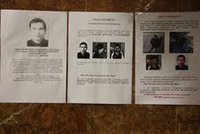Ukraine's Karavan killer suspect found dead
By Graham Phillips

It was an incident which stunned a Ukraine largely unaccustomed to gun killings. Now, suspected triple killer Yaroslav Mazurok has been found dead in Kiev, apparently having been holed up in a makeshift den in woods of Syretskyi Park, near the city's Dorogozhychi metro. However, rather than providing closure, this November 7th discovery of Mazurok's corpse would seem to be the latest instalment in a serpentine sequence of events following the September slaying.
News of Mazurok's body being found came just over a week after he was 'voted for' in the Ukrainian October 28th election (someone spoiled a ballot paper by writing his name on it), his having the day before apparently been apprehended by police in Kiev, as conspiracy theories abounded as to what really happened on September 26th. The October 27th Kontraktova metro capture had come just days after Mazurok's wife's lawyer said he believed Mazurok (who his wife has always contended was innocent) to be already dead, perhaps having killed himself due to the false accusations levelled against him.
Mazurok and Karavan
On September 26th, three security guards were shot dead in the back room of the Karavan shopping mall in Kiev. The killings came after a man had been caught on camera taking a USB flash drive, before seemingly attempting to conceal it from the cashier. Apprehended, and removed to a back room, the man later accused of being Mazurok proficiently produced a gun and killed three security guards, seriously injuring a fourth, before making his getaway.
At the time, the consensus was that it was a tragic case of security having picked on the wrong guy, a freak occurrence. Initial reports were of a professional Russian hitman, with at least 18 previous victims. Subsequently Mazurok, a Ukrainian Lviv native, was identified as the perpetrator, with posters of CCTV captures going up across Kiev and him put on international 'wanted' lists.
As the manhunt stretched from days into weeks, however, theories started to be advanced attesting to something more endemic than simply a lone madman, waiting to explode into fatal violence given provocation.
The first put forward, and circulated widely online, is that the security guards were participating in what, lamentably, counts as 'standard practice' in a country with an unflattering record on corruption. That is, that the guards were trying to extract a bribe from Mazurok, in order not to call the police. Mazurok, with little money on him, and a past which would have been of great interest to police, simply felt he could not afford to take the risk of police involvement, and to that end, did whatever he felt he had to, to escape. That this practice exists was substantiated by an undercover report from Ukraine's Channel 1+1, who in an expose, revealed Karavan security guards extracting bribes not to call the police when a person had been accused of wrongdoing.
The second theory, advanced by Mazurok's wife's lawyer Lawrence Kuhaleyshvili, on her behalf, is far more sinister. That on October 18th, a bill was due in Ukrainian parliament to debate security guards being allowed to carry weapons. The bill was duly passed, with Mazurok's wife Lyudmila feeling that the smoothness of its passage owed directly to events of September 26th, and making a strong connection between the two.
Her grievances, expressed through an interview with Kuhaleyshvili in Segodnya, began with the 'botched' investigation headed by Ukrainian Interior Minister Vitaliy Zakharchenko, and failings such as the releasing of Mazurok's name as a suspect before a proper investigation had been undertaken, thus compromising any examination of DNA. Lyudmila also believed the man in the YouTube video shown carrying out the execution was not actually her husband - with his having initially been described as 25-30 years old, and Mazurok actually 38. Moreover, she contended that not only did her husband not have the army training necessary (despite his having been reported as serving in the military in Uzbekistan) for such a quick, and lethal execution, but had arthritis affecting his joints, thus ability to hold a gun. Moreover, his employment, she stated, was rather itinerant plasterer than security worker.
Lyudmila conceded that Mazurok had been missing since September 27th, apparently having returned home after the incident and deposited the milk and bread in the fridge, his wife waking up to find his phone left on the table, and her husband gone. However, she believed he was on the run, tipped off, having been framed by security companies who staged the assassination using a professional hitman. They did so, Lyudmila put forward, in order to ensure the passage of the parliamentary bill on security guards bearing arms. Citing the vested interests of 'five thousand security firms' in the issue, she portrayed her husband as the fall guy of the piece.
The Law
TherehavebeenfearsthenewlawOnSecurityActivitywillbeinterpretedtoallowsupermarketstostrike those suspected of misdeed with batons, dogs, and even chain in handcuffs. President of the Ukrainian Federation of Security Professionals, Serhiy Shabovta, however, said in a recent interview with KP.UA that excessive violence and weaponry were unlikely to have any real impact on the everyday customer, and that in any case the legislation only permits for non-lethal weapons. Yet fears persist and there have even been calls online for a boycott of supermarkets. Moreover, with the provisions of the new act comes the requirement for guards to be trained in using any 'weapons' which would be at their disposal. This has created fears that the cost of such training will be passed on to supermarket and in turn, result in higher prices at the checkout.
Shabovta was quick to quell fears that security guards would be allowed to bear their weapons off-duty, and would be permitted to use their own arms at their place of work. He also pointed out that Article 16 states that the use of any such non-lethal weapons will be unacceptable in public places.
There are still fears, though, about the practices of the 'back room' of Ukrainian supermarkets and other large stores, of the kind in which Mazurok was filmed. Here, by law, the name and details of any operating security company should be displayed prominently. This is so anyone accused is able to report the security company to the police, which should then trigger a police inspection of the security company in question. Doubts persist about the seriousness with which any such complaint is taken though, given that there has yet to be a prosecution carried out on a security company based on such a police investigation.
The Grey Areas
Searching is a grey area - legally, only the police can do it, not the security who have detained the person. However, refusing such a request may be difficult. An issue with the current system is that criminal liability is incurred if the amount stolen exceeds 107 hryvnia, 30 kopecks. Under that amount, and the matter is technically between the perpetrator and the establishment. However, even over that, the police have no power to issue a fine, as only the courts are vested with such powers. It is unlikely a person would actually be taken to court for an amount in the low hundreds of hryvnia, thus a situation has arisen of the police asking, or in cases demanding a bribe not to mark the event on a citizen's record. This after security companies may have already attempted to extract payment not to call the police.
The new law states, in Article 11, that any security guard must be a person aged 18, minimum, with professional training. Extra assistance or provision must be provided for those with psychological issues, addictions, or criminal convictions. However, the reality is that with security guards typically being paid around 150hryvnia, or less, a day, the temptation to extract a bribe will always exist. Shabovta has furthermore stated that he regards only a quarter of the officially registered security companies as providing an acceptable level of service. And with an estimated million people working in the Ukrainian security sector, be it registered or unregistered (and it has been reported that the Karavan guards were unregistered), any regulation of this low-paid, and to a certain extent, rather shady, industry, will be problematic.
'Inconsistencies'
As for Mazurok, his wife further asserted that there were inconsistencies in the CCTV videos, including cutting out in parts, and a suspicious knowledge on the assailant's part of camera location in the supermarket, which point to it all being staged. She also finds it unlikely that anyone in possession of a firearm would allow themselves to be led into the back room by security guards.
The executive director of Karavan, Serhiy Kyslenko, had promised Hr 100,000 for assistance in finding the killer, as police leave and time off was cancelled. It would now seem that the man reported as taken into police custody on October 27th was not Mazurok, although police have yet to issue an official statement in that respect. Mazurok had apparently been camped out 1.5km from the apartment he had shared with his wife, daughter and mother-in-law. His body was said to be barefoot, without socks, and in a poor state of physical cleanliness, with a gun nearby, linked to the Karavan killings, and a passport identifying him. His relatives have now accepted that the deceased is Mazurok, but contend his innocence, and doubt the given explanation of suicide.
More outlandish conspiracy theories online suggest that perhaps no one was really killed in the September 26th Karavan incident, and it was all staged. In any case, the reverberations both of the Mazurok case, and the new law on arming security guards, seem set to impact well into Ukraine's future.
Graham Phillips is an English journalist living in Kiev. He has also written about this subject for the Kyiv Post.
His book Kiev or Kyiv - Notes from a Year in Ukraine - is out soon.
Subscribe to Pravda.Ru Telegram channel, Facebook, RSS!





